{
"name": "Sage Abdullah",
"pronouns": ["he", "him"],
"background": "Wagtail Developer, Torchbox",
"experiences": [
{
"title": "Google Summer of Code",
"year": 2019,
"organization": "Django Software Foundation",
"project": "Cross-DB JSONField"
}
],
"username": "laymonage"
}
JSONField
JSONField
“A field for storing JSON-encoded data.”
JSONField
“A field for storing JSON-encoded data.”
In Python, represented as:
dictliststrintfloatboolNone
JSON-encoded data
JSON-encoded data
{
"name": "Sage",
"active": true,
"age": 22,
"height": 170.0,
"interests": [
{"hobbies": ["reading", "coding"]},
{"others": ["cats", 42]}
]
}
JSON-encoded data
{
"name": "Sage",
"active": true,
"age": 22,
"height": 170.0,
"interests": [
{"hobbies": ["reading", "coding"]},
{"others": ["cats", 42]}
],
"partner": null
}
JSON-encoded data
# This is in Python
data = '''{
"name": "Sage",
"active": true,
"age": 22,
"height": 170.0,
"interests": [
{"hobbies": ["reading", "coding"]},
{"others": ["cats", 42]}
],
"partner": null
}'''
Databases
Databases
class Profile(models.Model):
user = models.OneToOneField(User, on_delete=models.CASCADE)
status = models.CharField(max_length=255)
last_sync = models.DateTimeField(auto_now=True)
config = models.JSONField()
Databases
| myapp_profile | |||
|---|---|---|---|
| user_id | status | last_sync | config |
| 32 | Happy! | 2020-08-17T19:45:05.481516 |
|
| 97 | Bored... | 2020-08-15T12:34:56.123456 |
|
Databases
| myapp_profile | |||
|---|---|---|---|
| user_id | status | last_sync | config |
| 32 | Happy! | 2020-08-17T 19:45:05.481516 | {"dark_mode": true, "font_size": 1, "color_scheme": "blue"} |
| 97 | Bored... | 2020-08-15T 12:34:56.123456 | {"dark_mode": false, "font_size": 3, "color_scheme": "red"} |
JSONField
JSONField
How does it work?
JSONField
How does it work?
class Profile(models.Model):
...
config = models.JSONField()
JSONField
How does it work?
class Profile(models.Model):
...
config = models.JSONField()
>>> config = {'dark_mode': True, 'font_size': 2, 'color_scheme': 'pink'}
>>> profile = Profile.objects.create(config=config)
>>> # Some time later...
>>> saved_profile = Profile.objects.get(id=profile.id)
>>> saved_profile.config == config
True
JSONField
How does it work... in the background?
>>> config = {'dark_mode': True, 'font_size': 2, 'color_scheme': 'pink'}
>>> profile = Profile.objects.create(config=config)
>>> # Some time later...
>>> saved_profile = Profile.objects.get(id=profile.id)
>>> saved_profile.config == config
True
>>> saved_profile.config
{'dark_mode': True, 'font_size': 2, 'color_scheme': 'pink'}
>>> saved_profile.config['font_size'] = 3
>>> saved_profile.save()
>>> Profile.objects.get(id=saved_profile.id).config['font_size']
3
JSONField
How does it work... in the background?
>>> config = {'dark_mode': True, 'font_size': 2, 'color_scheme': 'pink'}
>>> profile = Profile.objects.create(config=config)
>>> # Some time later...
>>> saved_profile = Profile.objects.get(id=profile.id)
>>> saved_profile.config == config
True
>>> saved_profile.config
{'dark_mode': True, 'font_size': 2, 'color_scheme': 'pink'}
>>> saved_profile.config['font_size'] = 3
>>> saved_profile.save()
>>> Profile.objects.get(id=saved_profile.id).config['font_size']
3
JSONField
How does it work... in the background?
>>> config = {'dark_mode': True, 'font_size': 2, 'color_scheme': 'pink'}
>>> profile = Profile.objects.create(config=config)
>>> # Some time later...
>>> saved_profile = Profile.objects.get(id=profile.id)
>>> saved_profile.config
{'dark_mode': True, 'font_size': 2, 'color_scheme': 'pink'}
JSONField
How does it work... in the background?
>>> config = {'dark_mode': True, 'font_size': 2, 'color_scheme': 'pink'}
>>> profile = Profile(config=config)
>>> profile.save()
>>> # Some time later...
>>> saved_profile = Profile.objects.get(id=profile.id)
>>> saved_profile.config
{'dark_mode': True, 'font_size': 2, 'color_scheme': 'pink'}
JSONField
How does it work... in the background?
>>> config = {'dark_mode': True, 'font_size': 2, 'color_scheme': 'pink'}
>>> profile = Profile(config=config)
>>> profile.save()
>>> # Turn the config into JSON-encoded data!
>>> '{"dark_mode": true, "font_size": 2, "color_scheme": "pink"}'
>>> saved_profile = Profile.objects.get(id=profile.id)
>>> saved_profile.config
{'dark_mode': True, 'font_size': 2, 'color_scheme': 'pink'}
JSONField
How does it work... in the background?
>>> config = {'dark_mode': True, 'font_size': 2, 'color_scheme': 'pink'}
>>> profile = Profile(config=config)
>>> profile.save()
>>> # Turn the config into JSON-encoded data!
>>> '{"dark_mode": true, "font_size": 2, "color_scheme": "pink"}'
>>> # Eventually, it will be:
>>> """
INSERT INTO myapp_profile
VALUES (42, '{"dark_mode": true, "font_size": 2, "color_scheme": "pink"}')
"""
>>> saved_profile = Profile.objects.get(id=profile.id)
>>> saved_profile.config
{'dark_mode': True, 'font_size': 2, 'color_scheme': 'pink'}
JSONField
How does it work... in the background?
>>> config = {'dark_mode': True, 'font_size': 2, 'color_scheme': 'pink'}
>>> profile = Profile(config=config)
>>> profile.save()
>>> # Turn the config into JSON-encoded data!
>>> '{"dark_mode": true, "font_size": 2, "color_scheme": "pink"}'
>>> # Eventually, it will be:
>>> """
INSERT INTO myapp_profile
VALUES (42, '{"dark_mode": true, "font_size": 2, "color_scheme": "pink"}')
"""
>>> saved_profile = Profile.objects.get(id=profile.id)
>>> """SELECT id, config FROM myapp_profile WHERE id = 42"""
>>> saved_profile.config
{'dark_mode': True, 'font_size': 2, 'color_scheme': 'pink'}
JSONField
How does it work... in the background?
>>> config = {'dark_mode': True, 'font_size': 2, 'color_scheme': 'pink'}
>>> profile = Profile(config=config)
>>> profile.save()
>>> # Turn the config into JSON-encoded data!
>>> '{"dark_mode": true, "font_size": 2, "color_scheme": "pink"}'
>>> # Eventually, it will be:
>>> """
INSERT INTO myapp_profile
VALUES (42, '{"dark_mode": true, "font_size": 2, "color_scheme": "pink"}')
"""
>>> saved_profile = Profile.objects.get(id=profile.id)
>>> """SELECT id, config FROM myapp_profile WHERE id = 42"""
>>> '{"dark_mode": true, "font_size": 2, "color_scheme": "pink"}'
>>> saved_profile.config
{'dark_mode': True, 'font_size': 2, 'color_scheme': 'pink'}
Python's json library
Python's json library
>>> import json
>>> config = {'dark_mode': True, 'font_size': 2, 'color_scheme': 'pink'}
>>> encoded = json.dumps(config)
>>> encoded
'{"dark_mode": true, "font_size": 2, "color_scheme": "pink"}'
>>> decoded = json.loads(encoded)
>>> decoded
{'dark_mode': True, 'font_size': 2, 'color_scheme': 'pink'}
>>> decoded == config
True
Transforms and Lookups
Transforms and Lookups
{
"name": "Sage",
"age": 22
}
>>> MyModel.objects.filter(some_json_field__name='Sage')
Transforms and Lookups
{
"name": "Sage",
"age": 22
}
{
"name": "Sage",
"age": 22,
"partner": null
}
>>> MyModel.objects.filter(
some_json_field__partner__isnull=True)
>>> MyModel.objects.filter(
some_json_field__partner=None)
Transforms and Lookups
Containment
{
"name": "Sage",
"age": 22,
"pets": [
{"name": "Bagol", "species": "cat"},
{"name": "Foxy", "species": "fox"}
]
}
>>> MyModel.objects.filter(
some_json_field__contains={
"age": 22,
"pets": [{"species": "cat"}]
}
)
Transforms and Lookups
Containment
{
"name": "Sage",
"age": 22
}
>>> MyModel.objects.filter(
some_json_field__contained_by={
"age": 22,
"name": "Sage",
"pets": [
{"name": "Bagol", "species": "cat"},
{"name": "Foxy", "species": "fox"}
]
}
)
Transforms and Lookups
Key existence
>>> MyModel.objects.filter(some_json_field__has_key='pets')
>>> MyModel.objects.filter(
some_json_field__has_keys=['pets', 'age'])
>>> MyModel.objects.filter(
some_json_field__has_any_keys=['pets', 'age'])
How does this fit into Wagtail?
The easy wins
PageRevision
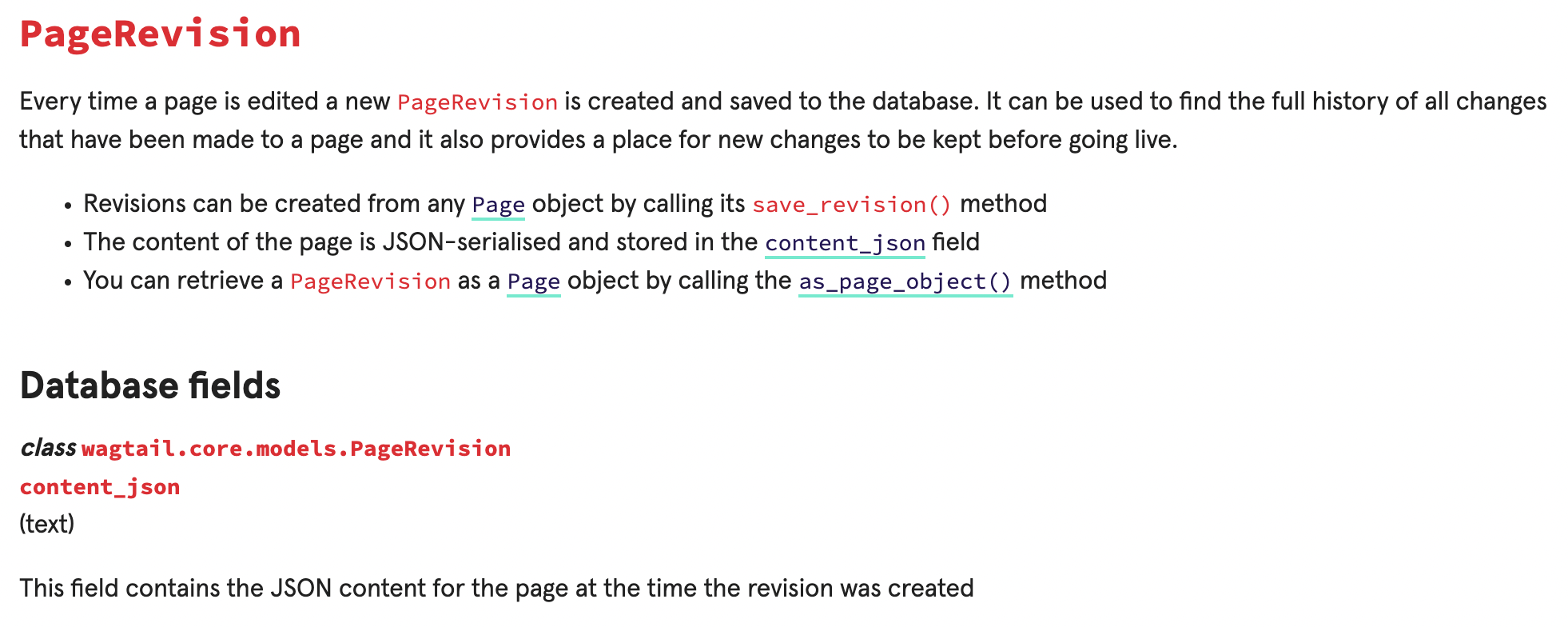 docs.wagtail.org/en/2.16.1/reference/pages/model_reference.html
docs.wagtail.org/en/2.16.1/reference/pages/model_reference.html
PageRevision
class PageRevision(models.Model):
...
content_json = models.TextField(
verbose_name=_("content JSON")
)
...
PageRevision
class PageRevision(models.Model):
...
content_json = models.JSONField(
verbose_name=_("content JSON")
)
...
PageRevision
class PageRevision(models.Model):
...
content = models.JSONField(
verbose_name=_("content JSON")
)
...
PageRevision
class PageRevision(models.Model):
...
content = models.JSONField(
verbose_name=_("content JSON"),
encoder=DjangoJSONEncoder
)
...
PageRevision
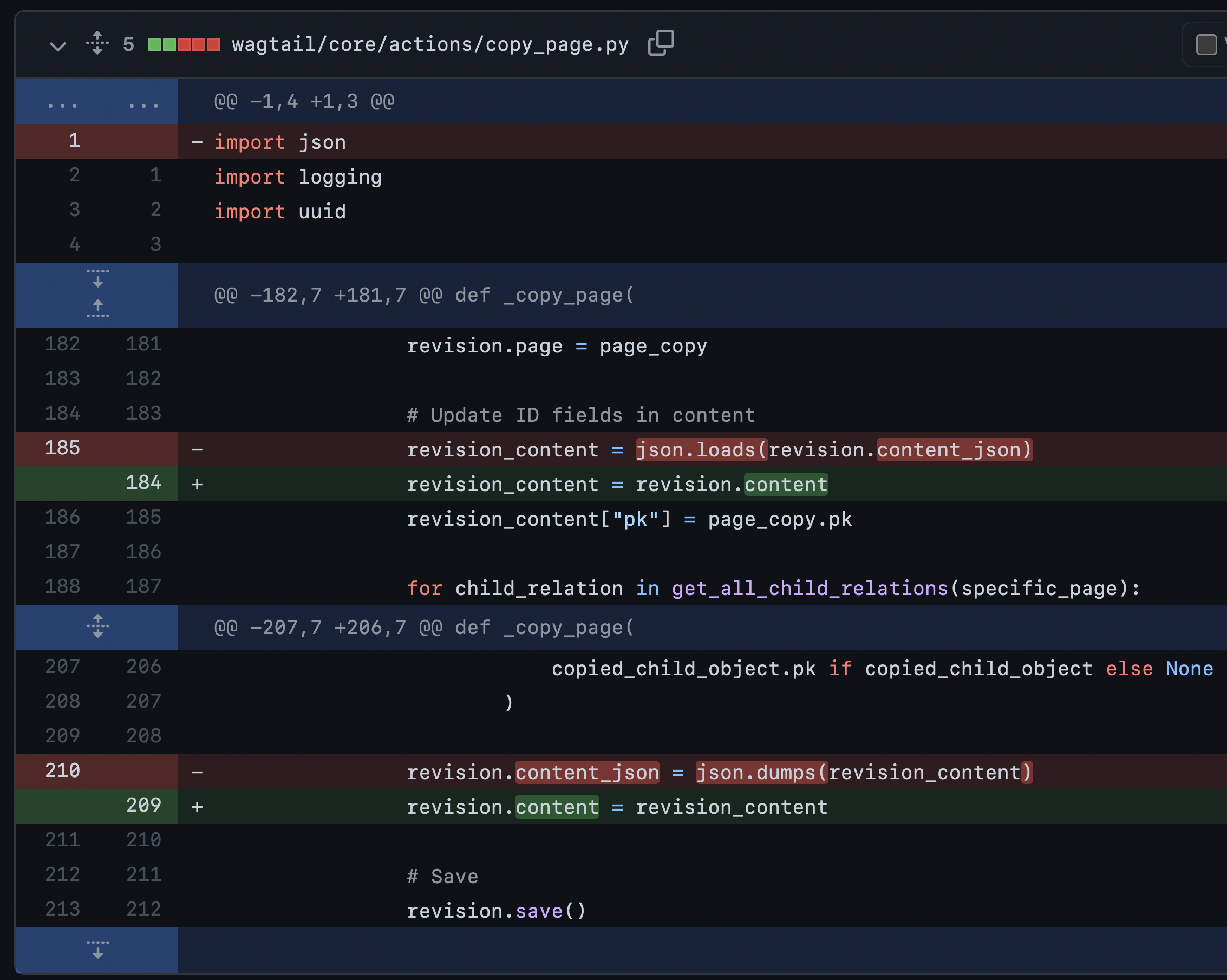
BaseLogEntry
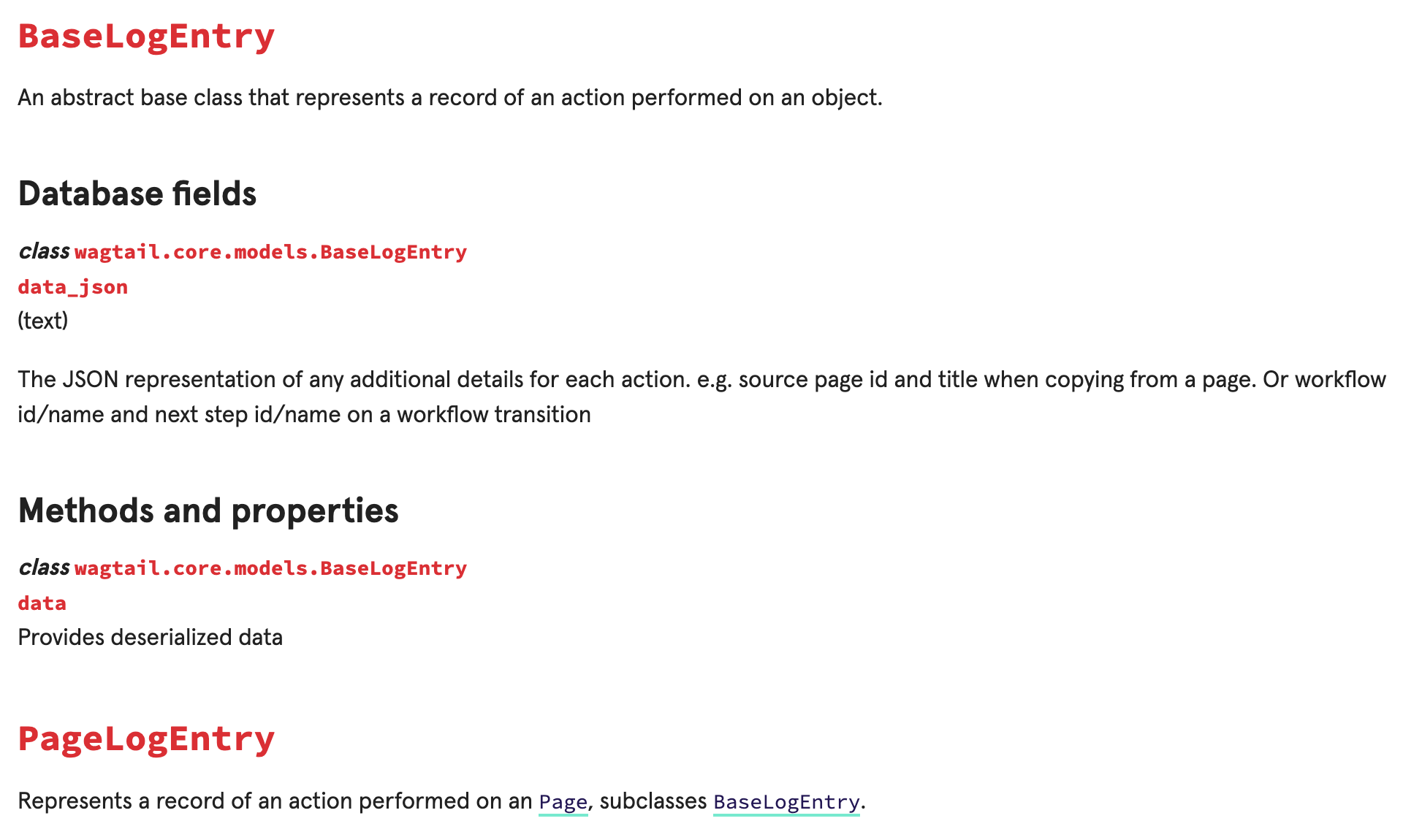 docs.wagtail.org/en/2.16.1/reference/pages/model_reference.html
docs.wagtail.org/en/2.16.1/reference/pages/model_reference.html
BaseLogEntry
class BaseLogEntry(models.Model):
...
data_json = models.TextField(blank=True)
...
BaseLogEntry
class BaseLogEntry(models.Model):
...
data = models.JSONField(blank=True)
...
BaseLogEntry
class BaseLogEntry(models.Model):
...
data = models.JSONField(blank=True, default=dict)
...
BaseLogEntry
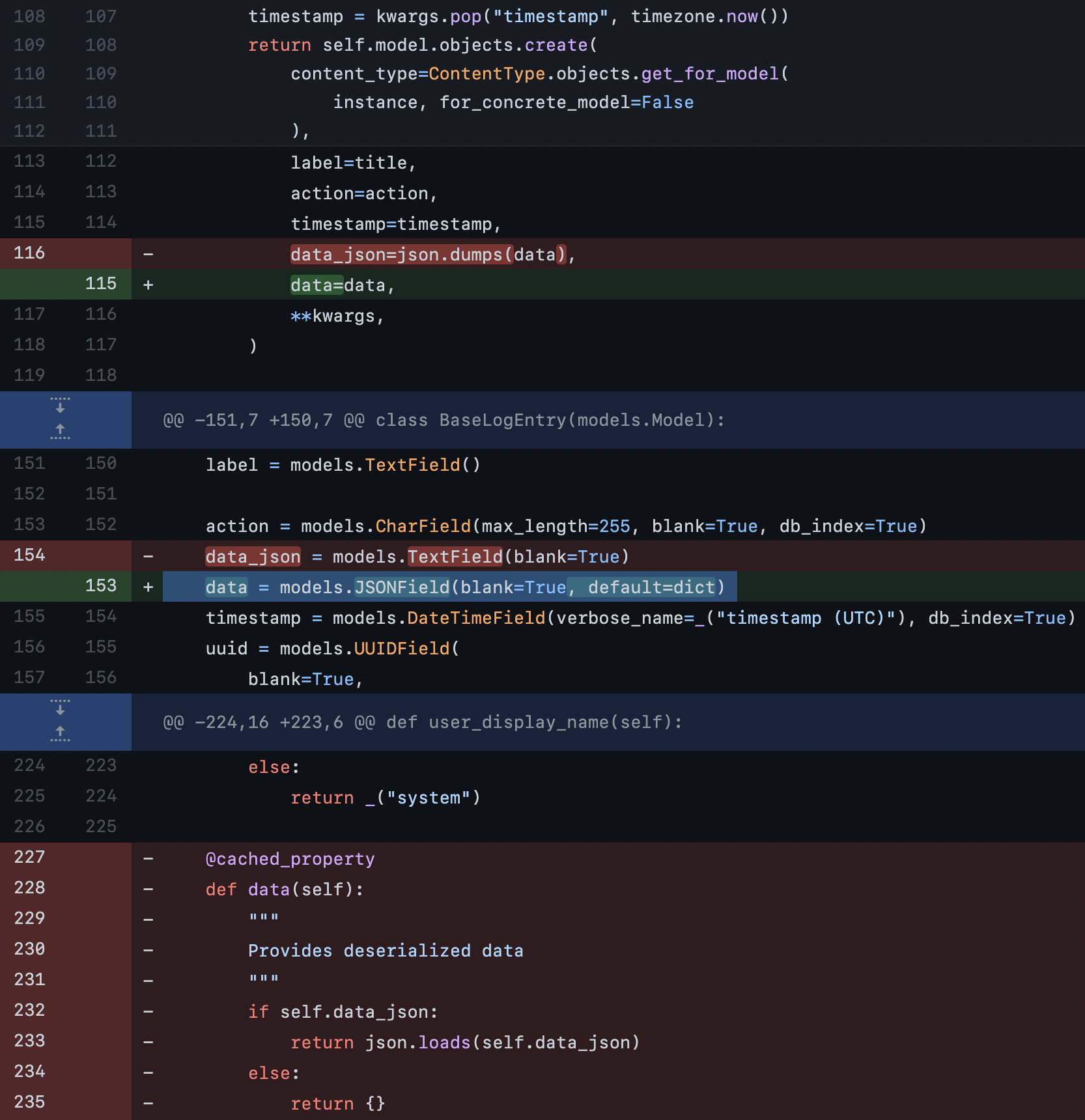
BaseLogEntry
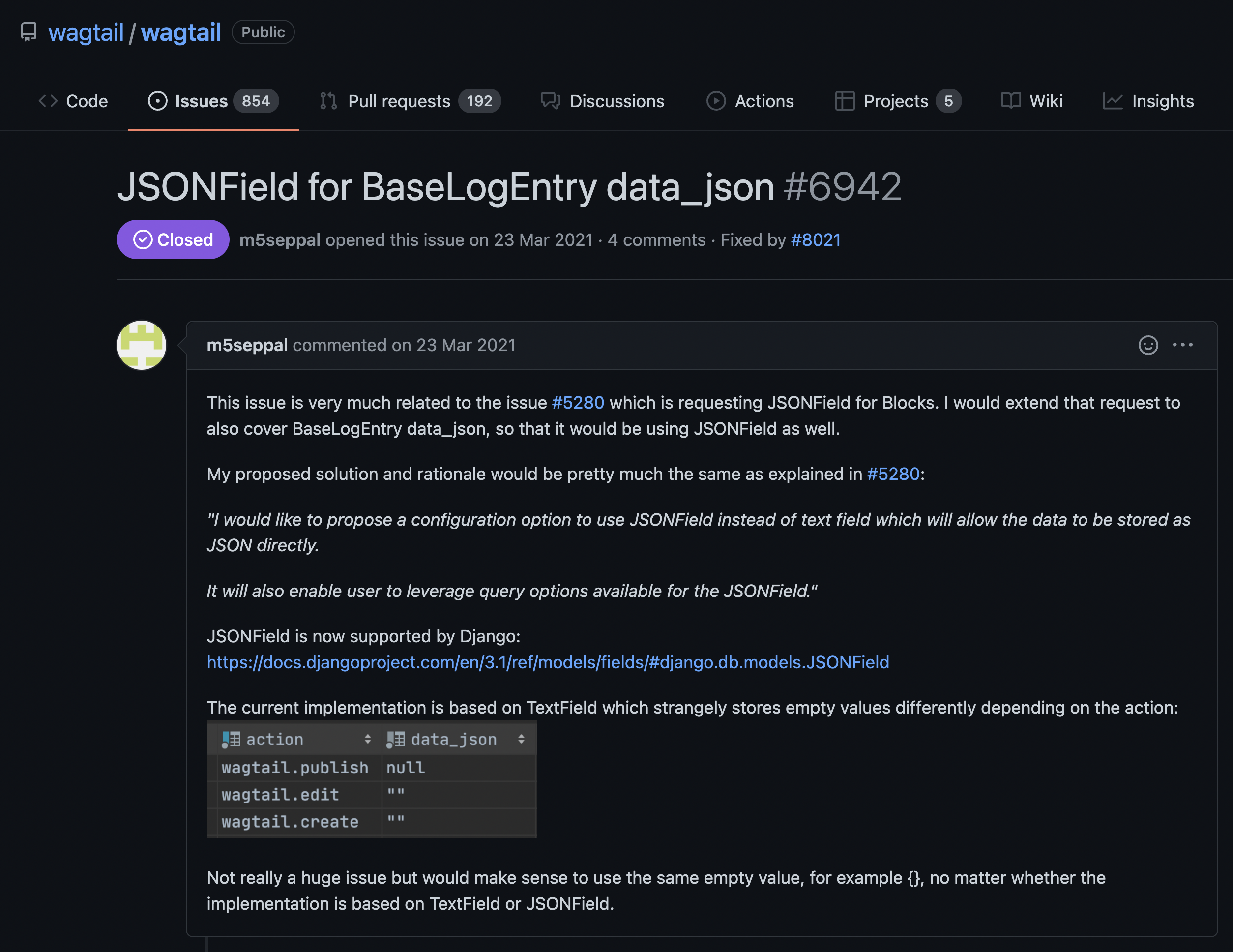
The not-so-easy wins
StreamField
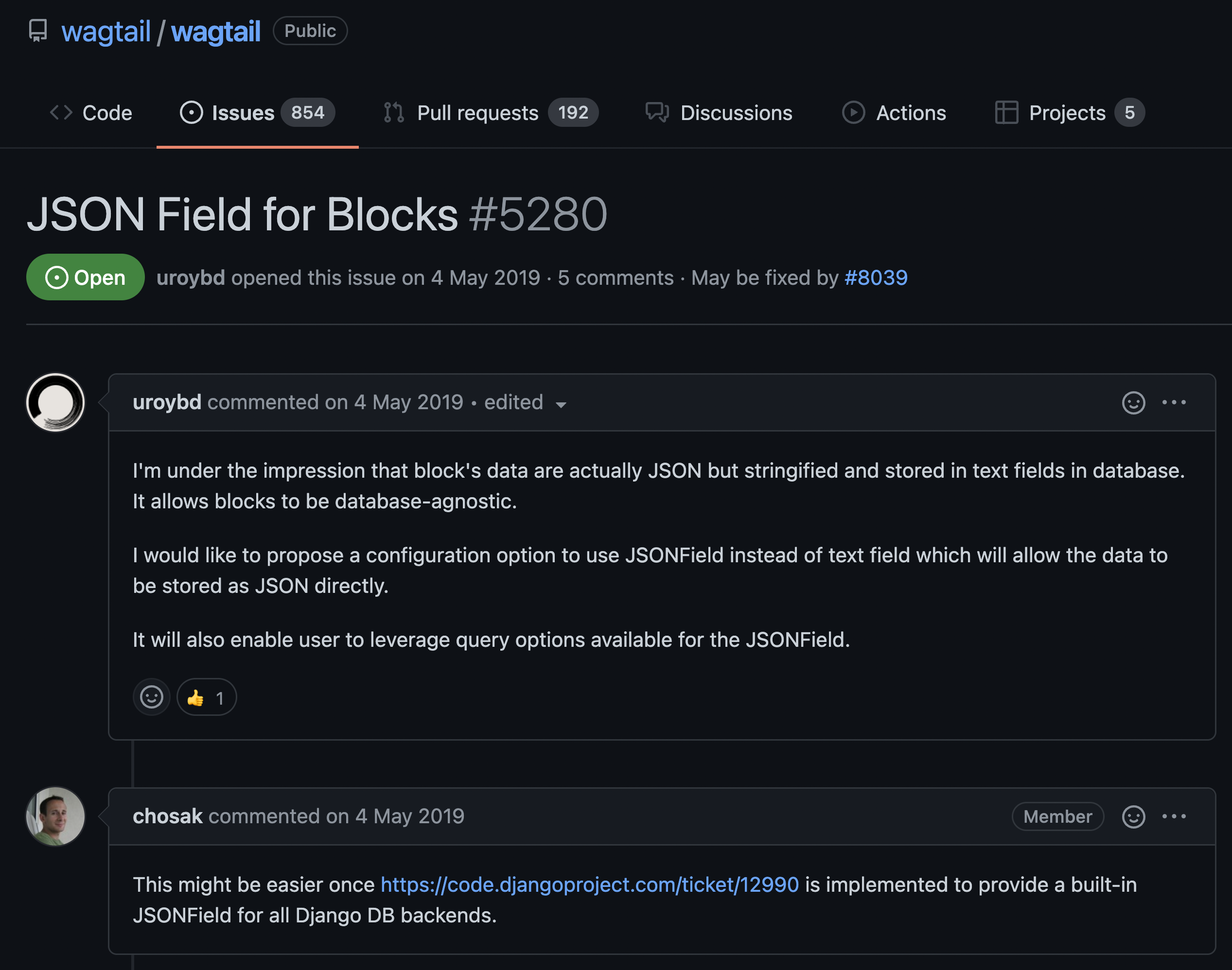
StreamField

StreamField
class StreamField(models.Field):
...
def get_internal_type(self):
return "TextField"

StreamField
class StreamField(models.Field):
...
def get_internal_type(self):
return "JSONField"

StreamField
class StreamField(models.Field):
...
def get_internal_type(self):
return "JSONField" # Doesn't work! 😢

The problem
The problem
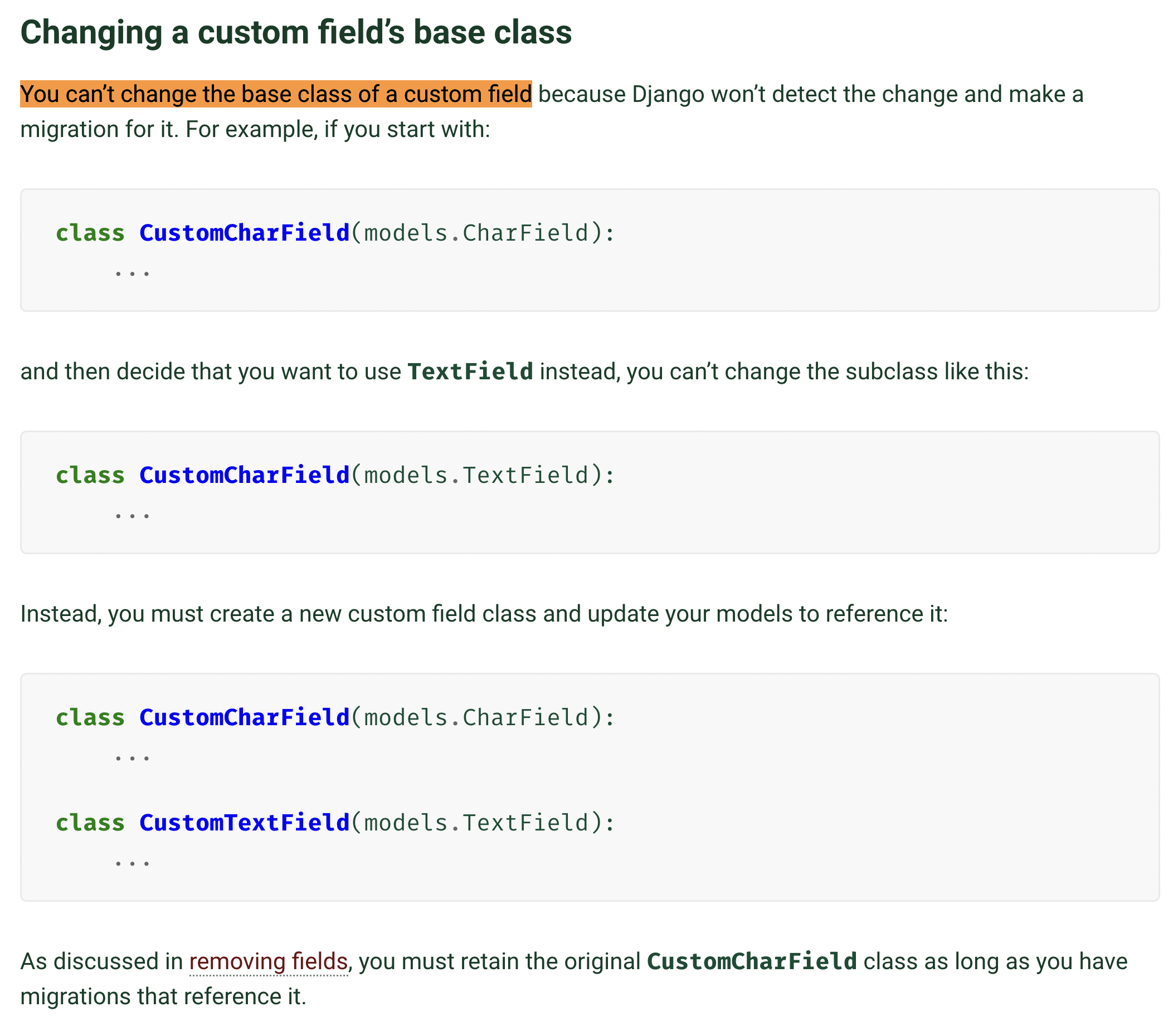
The solution
The solution
JSONStreamField? 🤔
The solution
JSONStreamField? ❎
use_json_field ✅
The solution
class StreamField(models.Field):
def __init__(self, block_types, use_json_field=None, **kwargs):
...
self.use_json_field = use_json_field
...
def deconstruct(self):
name, path, _, kwargs = super().deconstruct()
...
kwargs["use_json_field"] = self.use_json_field
return name, path, args, kwargs
The solution
class StreamField(models.Field):
...
def get_internal_type(self):
return "JSONField" if self.use_json_field else "TextField"
The solution
class StreamField(models.Field):
...
def get_lookup(self, lookup_name):
if self.use_json_field:
return models.JSONField().get_lookup(lookup_name)
return super().get_lookup(lookup_name)
def get_transform(self, lookup_name):
if self.use_json_field:
return models.JSONField().get_transform(lookup_name)
return super().get_transform(lookup_name)
The solution
class StreamField(models.Field):
...
@property
def json_field(self):
return models.JSONField(encoder=DjangoJSONEncoder)
def get_lookup(self, lookup_name):
if self.use_json_field:
return self.json_field.get_lookup(lookup_name)
return super().get_lookup(lookup_name)
def get_transform(self, lookup_name):
if self.use_json_field:
return self.json_field.get_transform(lookup_name)
return super().get_transform(lookup_name)
The solution
class StreamField(models.Field):
def __init__(self, block_types, use_json_field=None, **kwargs):
...
self.use_json_field = use_json_field
self._check_json_field()
...
def _check_json_field(self):
if type(self.use_json_field) is not bool:
warnings.warn(
"StreamField must explicitly set use_json_field "
"argument to True/False instead of "
f"{self.use_json_field}.",
RemovedInWagtail219Warning,
stacklevel=3,
)
Where we're at
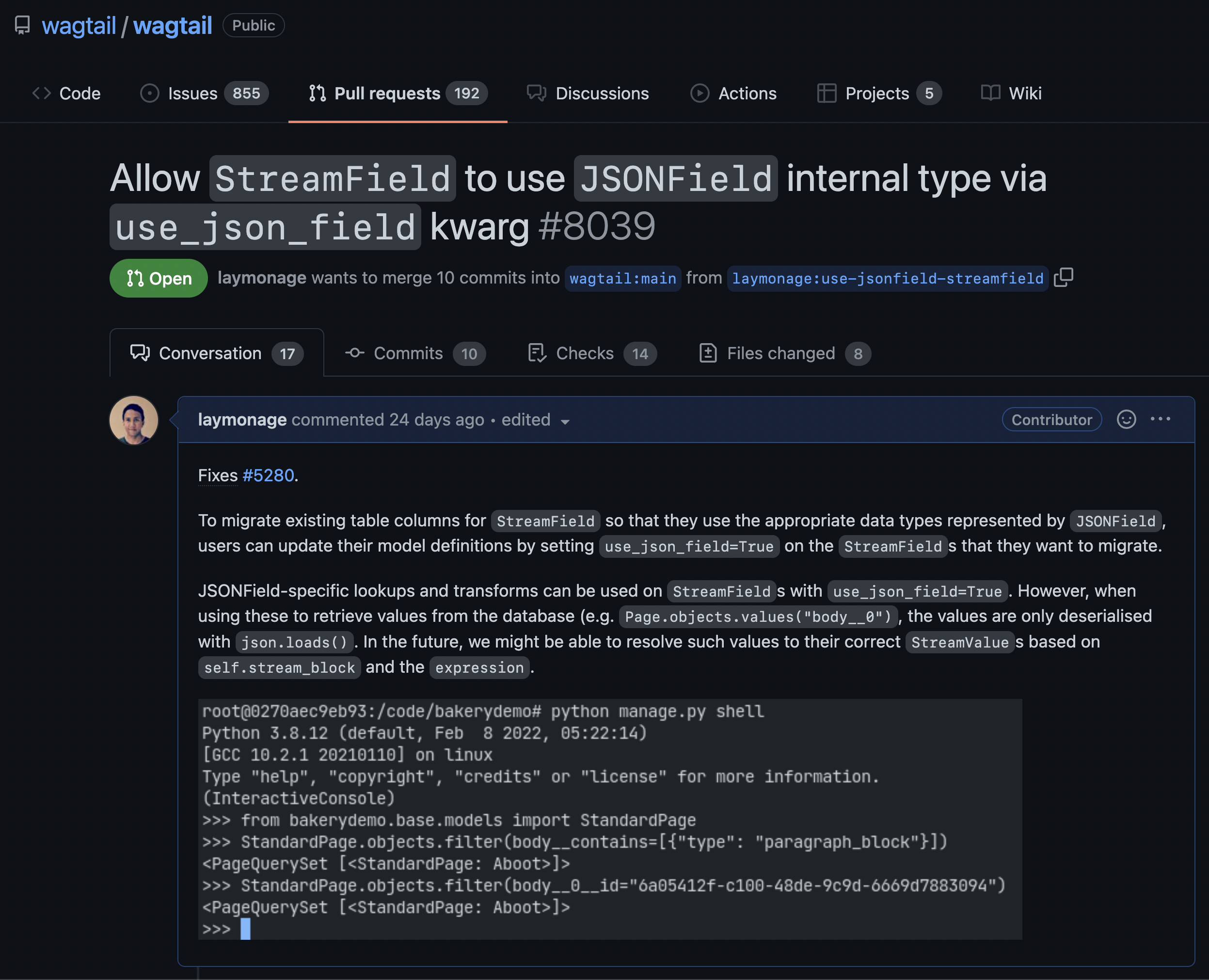
Where we're at
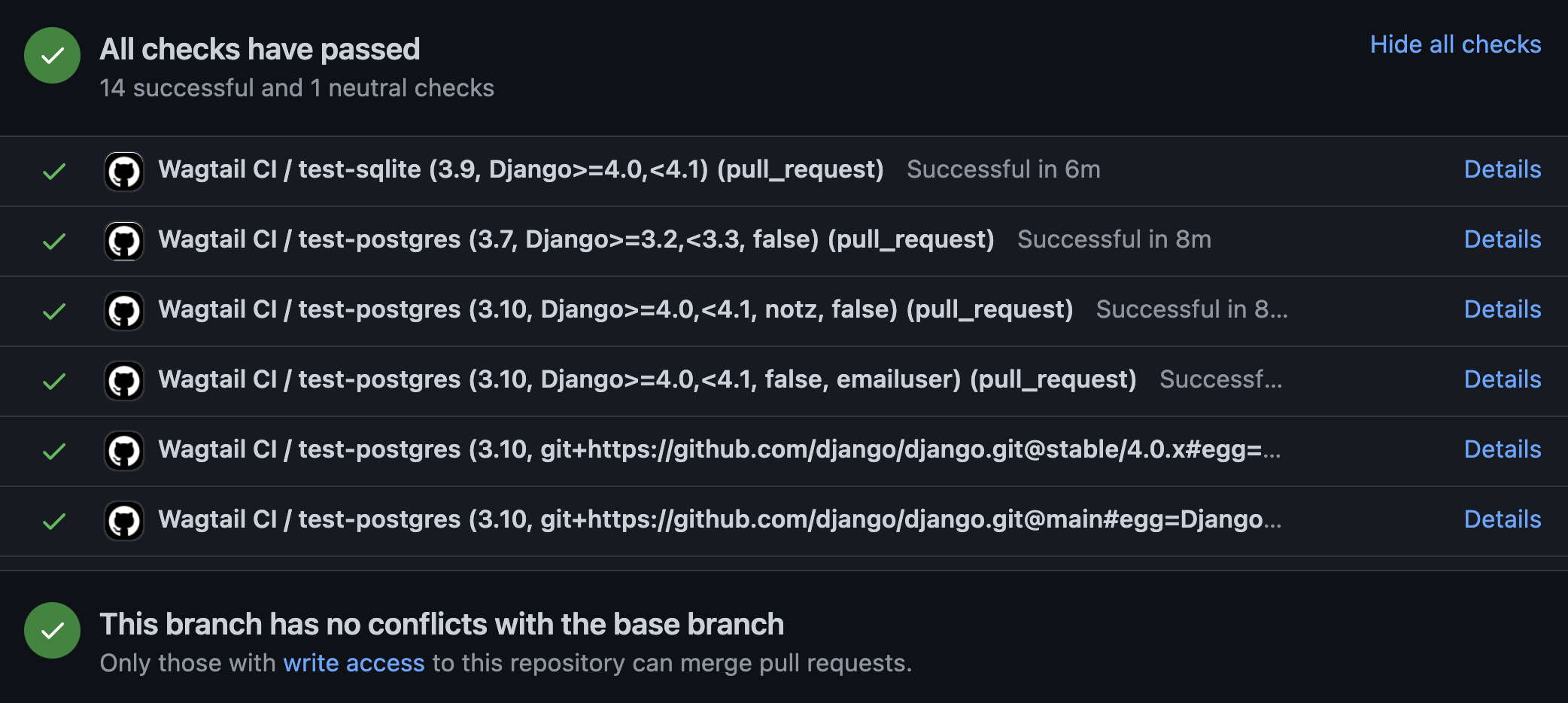
What could this bring?
What could this bring?
- Improved read performance*
- Smarter search with lookups and transforms
- New features for
StreamFields? - You tell me 😉
Thank you!
Thank you!
{
"name": "Sage Abdullah",
"username": "laymonage",
"slides": {
"hosted": "https://slides.laymonage.com/wagtail-jsonfield",
"source": "https://github.com/laymonage/slides-wagtail-jsonfield"
},
"prs": [
"https://github.com/wagtail/wagtail/pull/8021",
"https://github.com/wagtail/wagtail/pull/8024",
"https://github.com/wagtail/wagtail/pull/8039"
]
}